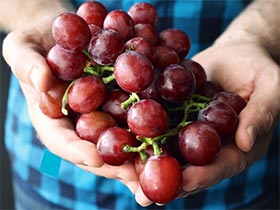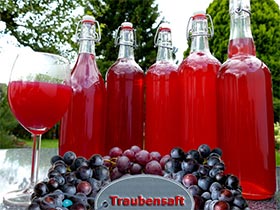One of the most popular fruit juice drinks in this country is grape juice. It ranks just behind apple, orange or multivitamin juice in fourth place. Rich in vitamins and nutrients, it is particularly suitable for people with blood or iron deficiency due to its high iron content. Red grape juice in particular is very popular with young and old alike.
But green and red grapes are not only packed with vitamins. Due to their high water content, they are among the foods recommended for maintaining a balanced fluid balance. The human body needs approx. 2.7 liters of fluid per day in order to function optimally. We should drink about 1.5 to 2 liters of it. If water-rich foods are on our menu, they are not only juicy and refreshing, they also help us to maintain our fluid balance.
According to studies, the juice of dark grapes, which contains a high number of flavonoids, is particularly good for your health. These are plant substances that are already used in the treatment of circulatory disorders and venous diseases. However, it was also discovered that red grape juice is healthy for people with heart disease, as regular consumption improves the flow properties of the blood. This dilates the blood vessels, improves blood lipid levels and lowers blood pressure. Grape juice is also suitable for strengthening the immune system. Studies have shown an influence on the healing of viral diseases.

Due to its many nutrients and vitamins, red grape juice is particularly suitable as a treatment for anemia, for blood purification or for dizziness and exhaustion – thanks to its high glucose content, which also boosts the body’s energy levels.
Because the body can absorb the vitamin C and iron from the juice in liquid form better than from the fruit itself, it is supplied with the important vitamins more quickly and for longer.
As with other fruit juices, grape juice contains even more healthy substances than grapes. During production, the stalk residues are still present and therefore their nutrients are also processed. The ingredients in red grape juice are even said to improve memory.
We have two American scientists to thank for a comprehensive overview of the possible effects. Under the direction of Maria Fernandez of the University of Connecticut, they have worked through all the studies on the effects of grapes, grape juice, grape seeds, grape skins, grape powder and grape extracts.
The diverse effects of grapes are based on their cell-protecting activity and the function of flavonoids, a group of secondary plant substances. Blue grapes – and therefore also dark grape juice – contain more secondary plant substances than light grapes. Most studies therefore also investigate the effect of blue grapes or dark grape juice.
In their review of the numerous studies, the two American scientists focused on those carried out on humans. They also used animal and cell culture studies to gain a better understanding of the underlying mechanisms.
The effect of red grape juice on heart disease has been the subject of particularly intensive research. By drinking daily over a period of usually two weeks, the risk of heart disease was reduced. Ingredients in red grape juice can improve the flow properties of the blood. Blood vessels can be dilated, platelet aggregation prevented and blood lipid levels improved. There are also signs of an active reduction in blood pressure.
Particularly interesting: It has been shown that less LDL cholesterol oxidizes after drinking red grape juice. This is significant insofar as the oxidation . Bei der Oxidation gibt ein Stoff Elektronen ab und wird positiv geladen. of LDL cholesterol can lead to arteriosclerosis in the long term. There is further evidence that the ingredients in red grape juice have a high cell-protecting capacity. Daily consumption of grape juice can reduce the formation of free radicals and lower inflammatory markers in the blood.

Grape cure
Grape cures were already recommended by Hippocrates, and the custom of drinking cures with fresh grape juice also persisted among winegrowers. Even a single day of grapes can do the body a lot of good. The carbohydrates contained in grapes provide the energy required for physical and mental activity: Dextrose is absorbed particularly quickly and supplies energy rapidly, while fructose provides a supply for endurance performance. So if you eat nothing but grapes for 24 hours, you will not only be sufficiently satiated, you will also feel particularly well.
Grapes contain 0.7% protein, hardly any fat and lots of carbohydrates, most of which consist of glucose and fructose. 100 g have 73 calories, over 80 % of the grapes are water.
In addition to calcium Chemisches Element Ca mit der Ordnungszahl 20, Mineralstoff, der zu den Mengenelementen zählt. Unter den Mineralstoffen ha..., phosphorus, iron, copper, manganese, fluorine and iodine, grapes contain a lot of zinc, which strengthens the immune system and improves the healing of wounds, and an excess of potassium, which stimulates kidney activity. The not particularly high content of vitamins A, B and C adds up when larger quantities are consumed, so that the daily requirement is sufficiently covered.
The medicinal effect of the sweet grapes is correspondingly great. They strengthen the heart, drain and promote kidney function. Intestinal function is stimulated, digestion is improved and the liver is strengthened.
The short cure can proceed as follows:
It begins the evening before, when 500 g of grapes are eaten for dinner. Nothing else. The next day you eat:
In the morning: 750 g grapes
Snack: 500 g grapes or 1/2 l grape juice (unsweetened)
Lunch: 750 g grapes
Afternoon: 500 g grapes or 1/2 l grape juice
Evening: 500 g grapes
The quantities can be reduced or increased as desired.
In addition, at least 2 liters of water should be drunk throughout the day.
Ripe, white grapes are best suited for a cure. Seedless if required and preferably organically grown. In any case, the grapes should be washed thoroughly with hot water.
If you wish, you can also extend the cure to two full days.
